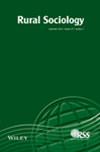Accounting for Culture in Evaluations of Climate‐Induced Noneconomic Losses and Damages: Case Studies With Three Indigenous Communities From Rural Fiji
IF 1.9
3区 社会学
Q2 SOCIOLOGY
引用次数: 0
Abstract
Many Indigenous societies have effective resilience strategies that have served them well for centuries. These strategies have enabled generations of people to cope with, adapt, and overcome diverse forms of adversity. For many semi‐subsistence‐based societies, climate change poses a different threat; one that has rendered some traditional adaptation pathways partially ineffective as natural resources have become less abundant and natural systems more unpredictable. This study presents narratives compiled through ethnography and qualitative research with three rural Indigenous气候引起的非经济损失和损害评估中的文化核算:斐济农村三个土著社区的案例研究
许多土著社会都有有效的复原力战略,几个世纪以来一直很有效。这些策略使几代人能够应付、适应和克服各种形式的逆境。对于许多半维持生计的社会来说,气候变化构成了不同的威胁;随着自然资源变得不那么丰富,自然系统变得更加不可预测,一些传统的适应途径已经部分失效。本研究介绍了通过民族志和定性研究对斐济两个岛屿上的三个农村土著iTaukei社区进行的叙述。部分归因于以关系主义为中心的文化价值观的盛行,这些社区保留了非常有效的社会弹性系统;然而,几乎每年一次的飓风事件以及相关的山体滑坡和地震造成的损失正在损害社区恢复和重建社会生活的重要方面的能力。本研究回应了对非经济损失和损害(NELD)形式和意义的经验证据的呼吁,通过提取在村民叙述中观察到的损失和损害的性别敏感、关系方面。
本文章由计算机程序翻译,如有差异,请以英文原文为准。
求助全文
约1分钟内获得全文
求助全文
来源期刊

RURAL SOCIOLOGY
SOCIOLOGY-
CiteScore
4.60
自引率
13.00%
发文量
47
期刊介绍:
A forum for cutting-edge research, Rural Sociology explores sociological and interdisciplinary approaches to emerging social issues and new approaches to recurring social issues affecting rural people and places. The journal is particularly interested in advancing sociological theory and welcomes the use of a wide range of social science methodologies. Manuscripts that use a sociological perspective to address the effects of local and global systems on rural people and places, rural community revitalization, rural demographic changes, rural poverty, natural resource allocations, the environment, food and agricultural systems, and related topics from all regions of the world are welcome. Rural Sociology also accepts papers that significantly advance the measurement of key sociological concepts or provide well-documented critical analysis of one or more theories as these measures and analyses are related to rural sociology.
 求助内容:
求助内容: 应助结果提醒方式:
应助结果提醒方式:


